Eating Your Way to Heart Health: 10 Must-Have Foods
Maintaining good heart health is essential for a long and fulfilling life. A key factor in achieving this is maintaining a balanced diet that includes foods known to promote heart health. While genetics and lifestyle play a role, incorporating heart-healthy foods into your daily meals can significantly reduce the risk of heart disease. In this article, we’ll explore the top 10 best foods for heart health, backed by scientific evidence.
Fatty Fish
Fatty fish like salmon, mackerel, trout, and sardines are rich in omega-3 fatty acids (including eicosapentaenoic acid (EPA) and docosahexaenoic acid (DHA), which have been shown to reduce the risk of heart disease. Omega-3s help lower blood pressure, reduce triglycerides, and prevent the development of abnormal heart rhythms.
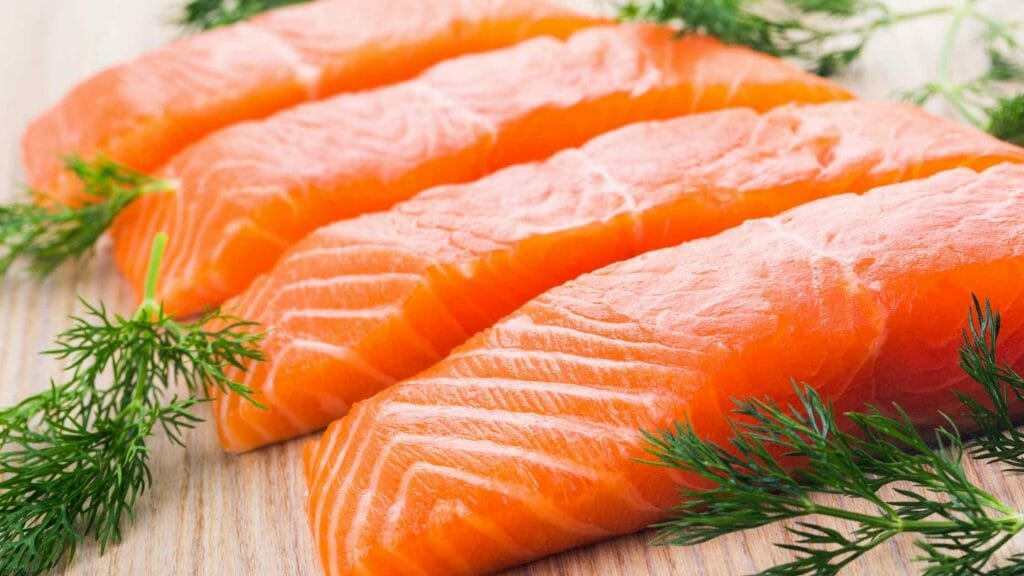
Cholesterol Management: While fatty fish itself is low in saturated fat, the omega-3 fatty acids it contains can help improve cholesterol profiles. They can increase high-density lipoprotein (HDL or “good” cholesterol) levels and reduce low-density lipoprotein (LDL or “bad” cholesterol) levels, which is crucial for heart health.
Anti-Arrhythmic Effects: Omega-3 fatty acids have anti-arrhythmic properties, meaning they can help stabilise the heart’s rhythm and reduce the risk of irregular heartbeats.
It’s important to note that while fatty fish is an excellent addition to a heart-healthy diet, moderation is key. Aim to incorporate fatty fish into your diet at least twice a week to reap the cardiovascular benefits.
Berries
Berries, such as blueberries, strawberries, and raspberries, are packed with antioxidants, fibre, and vitamins. These compounds have anti-inflammatory properties that help lower blood pressure and improve overall heart health.

Berries are packed with antioxidants, such as flavonoids, anthocyanins, and polyphenols. These compounds help combat oxidative stress and reduce the damage caused by free radicals. Lowering oxidative stress is associated with a reduced risk of heart disease.
Berries also have a relatively low glycemic index, meaning they have a mild impact on blood sugar levels. This can help stabilize blood sugar, reducing the risk of diabetes-related heart complications.
Nuts
Almonds, walnuts, and other nuts are excellent sources of heart-healthy fats, fibre, and antioxidants. Regular nut consumption has been linked to reduced cholesterol levels and a decreased risk of heart disease.
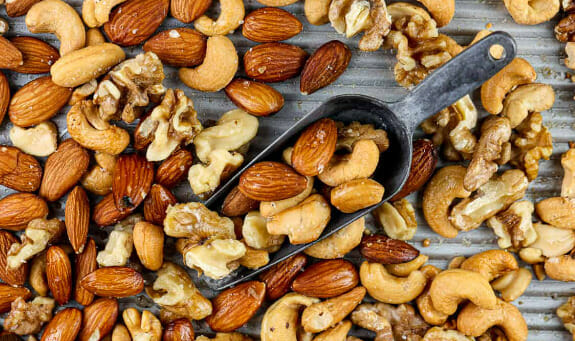
Vascular Health: The beneficial fats and antioxidants in nuts promote healthy blood vessel function and improve endothelial function. This contributes to better blood flow and reduces the risk of atherosclerosis (hardening of the arteries).
Oats
Oats are a fantastic source of soluble fibre, which can help lower cholesterol levels. They also provide a steady source of energy and help regulate blood sugar levels, reducing the risk of heart disease.
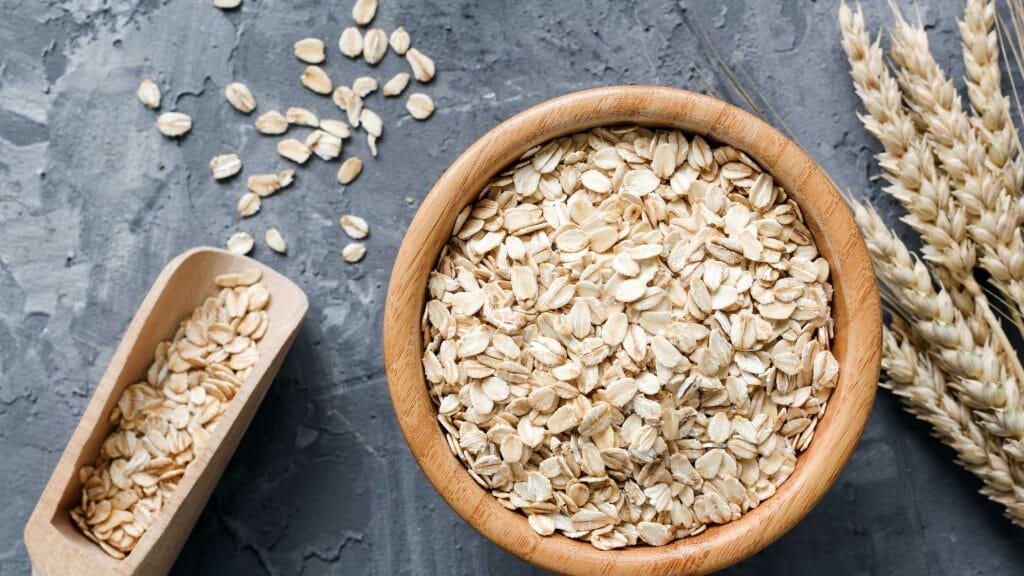
Soluble Fibre: Oats are rich in soluble fibre, particularly beta-glucans. Soluble fibre is known for its ability to lower LDL (bad) cholesterol levels. It does this by binding to cholesterol molecules in the digestive tract and preventing their absorption into the bloodstream, ultimately reducing the risk of atherosclerosis (hardening of the arteries) and heart disease.
Improved Gut Health: The fibre in oats promotes a healthy gut microbiome, which may indirectly benefit heart health. A balanced gut microbiome is associated with reduced inflammation and improved overall well-being.
To maximise the heart-healthy benefits of oats, aim to include them in your diet regularly.
Leafy Greens
Leafy greens like spinach, kale, and cabbage are rich in vitamins, minerals, and antioxidants. They are also low in calories and high in fibre, making them an excellent choice for maintaining a healthy heart.
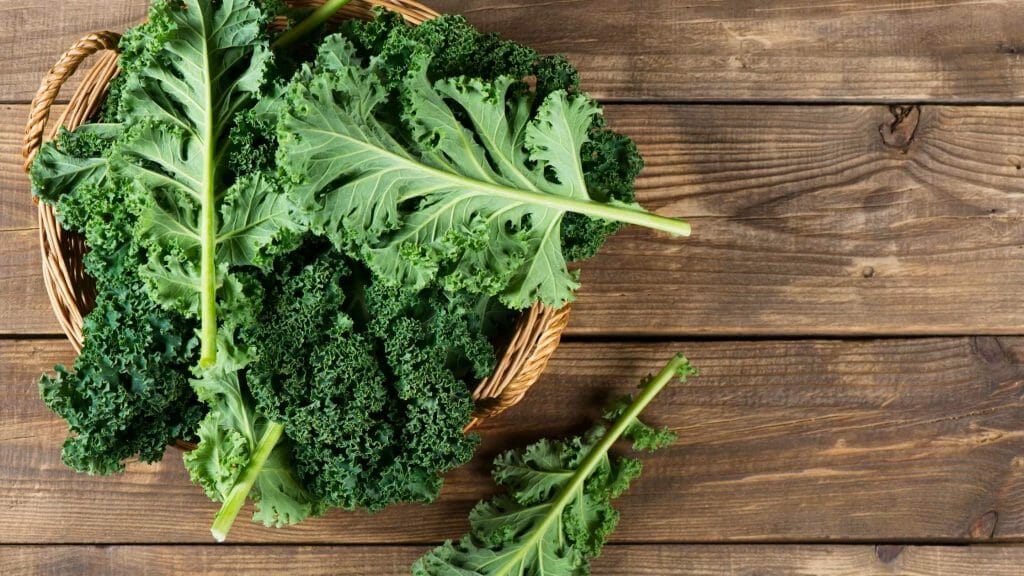
Low in calories but packed with essential nutrients like vitamins (A, C, K, and several B vitamins), minerals (including potassium and magnesium), and dietary fibre. These nutrients are crucial for overall health and contribute to heart health.
Leafy greens are also loaded with antioxidants, including carotenoids (such as lutein and zeaxanthin) and flavonoids. These compounds help combat oxidative stress and inflammation, both of which are linked to heart disease.
To maximise the heart-healthy benefits of leafy greens, aim to include them in your meals regularly. You can add them to salads, sandwiches, smoothies, soups, and stir-fries, or simply enjoy them as a side dish.
Additionally, you can add The Healthy Man Super Greens into your diet to get all these great benefits in a tasty drink! Includes 37+ quality superfood ingredients including Kale, Spinach and much more!
Whole Grains
Whole grains, such as brown rice, quinoa, and whole wheat pasta, are packed with fibre and nutrients. They can help lower cholesterol levels and reduce the risk of heart disease when consumed as part of a balanced diet.
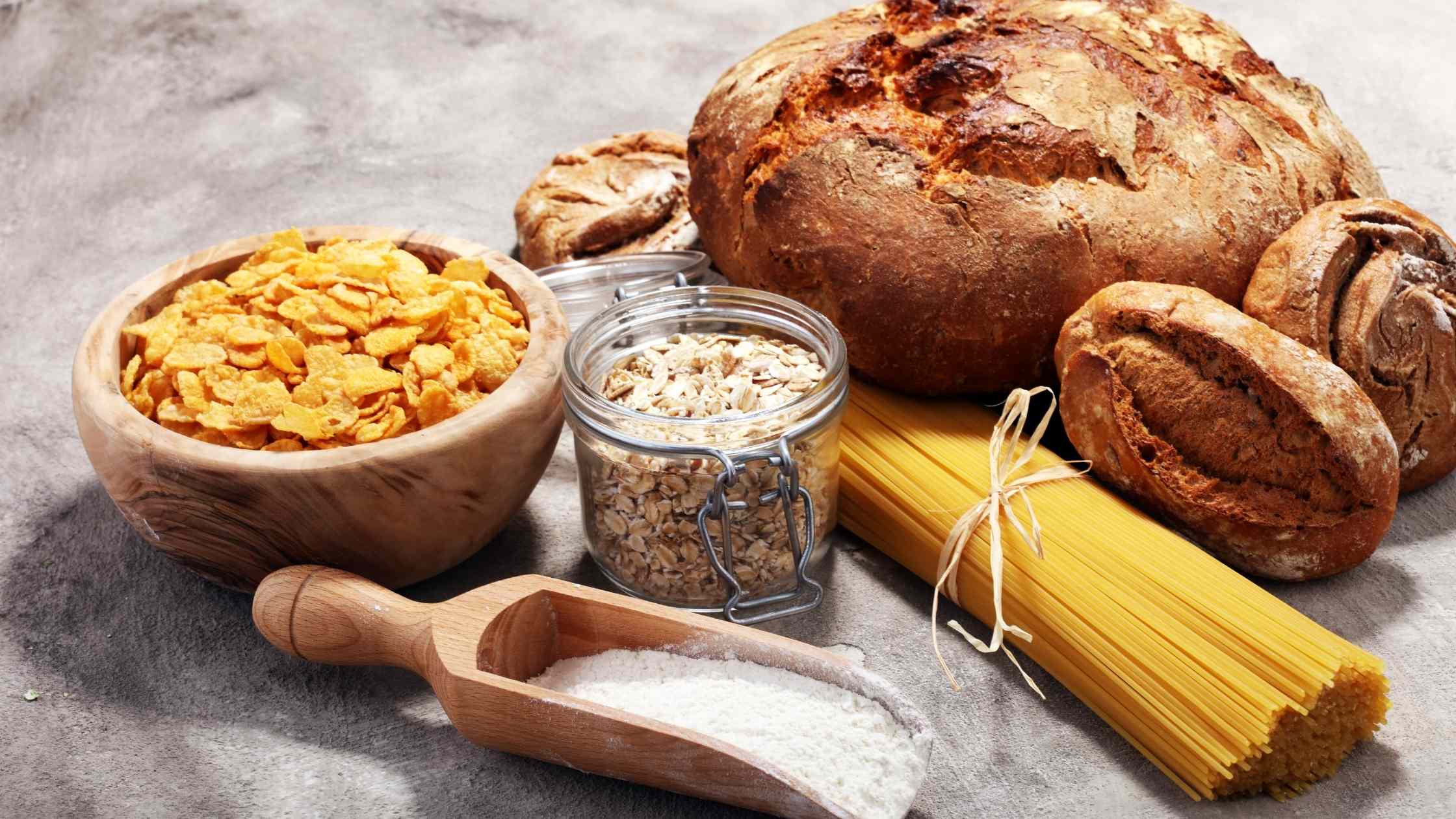
Found in abundance in whole grains, soluble fibre can help lower LDL (bad) cholesterol levels by binding to cholesterol molecules in the digestive tract and facilitating their excretion from the body. Lower LDL cholesterol is associated with a reduced risk of atherosclerosis (hardening of the arteries) and heart disease.
To incorporate more whole grains into your diet for heart health, choose foods like whole wheat bread, whole grain pasta, brown rice, quinoa, and whole grain cereals. Make an effort to replace refined grain products with their whole grain counterparts whenever possible.
Avocado
Avocado is a unique fruit that’s rich in monounsaturated fats. These fats can help reduce bad cholesterol levels and lower the risk of heart disease.

Avocado is known for its high content of heart-healthy fats, . These fats, particularly oleic acid, are considered beneficial for heart health because they can help reduce levels of LDL (bad) cholesterol in the blood while leaving HDL (good) cholesterol levels intact. Lower LDL cholesterol levels are associated with a reduced risk of atherosclerosis (hardening of the arteries) and heart disease.
Avocado is a good source of potassium, a mineral that plays a vital role in regulating blood pressure. A diet rich in potassium can help counteract the hypertensive effects of excessive sodium intake, promoting healthy blood pressure levels.
To incorporate avocados into your heart-healthy diet, you can add them to salads, sandwiches, or wraps, use them as a topping for toast or eggs, or blend them into smoothies for added creaminess. It’s important to remember that while avocados are a nutritious addition to your diet, they are calorie-dense, so portion control is essential, especially if you are mindful of calorie intake.
Tomatoes
Tomatoes are a great source of lycopene, an antioxidant linked to heart health. They may help reduce the risk of heart disease by lowering levels of LDL (bad) cholesterol. Lycopene is a powerful antioxidant that gives them their vibrant red colour, and has been associated with various heart-protective effects such as reducing oxidative stress and inflammation.

To incorporate more tomatoes into your diet for heart health, consider adding fresh tomatoes to salads, sandwiches, and salsas, or cooking with tomato-based sauces, pastes, and canned tomatoes.
Beans and Legumes
Beans and legumes, such as lentils, chickpeas, and black beans, are high in fibre, protein, and essential nutrients. They can help lower cholesterol levels and maintain stable blood sugar levels, reducing the risk of heart disease.

Beans and legumes can have favourable effects on lipid profiles, including lower triglyceride levels and increased HDL (good) cholesterol levels, which are beneficial for heart health. Additionally, they are nutrient-dense and provide a feeling of fullness, which can help control appetite and promote weight management. Maintaining a healthy weight is essential for heart health.
To incorporate more beans and legumes into your diet for heart health, consider adding them to soups, stews, salads, and grain bowls, or using them as a meat substitute in various recipes.
Dark Chocolate
In moderation, dark chocolate (with at least 70% cocoa content) can be a heart-healthy treat. It contains flavonoids that may improve heart health by reducing blood pressure and increasing blood flow.

Dark chocolate is rich in antioxidants, particularly flavonoids and polyphenols. These compounds help combat oxidative stress in the body, which can lead to inflammation and damage to cells, including those in the blood vessels. Reducing oxidative stress is important for heart health. Also, the flavonoids in dark chocolate have been shown to improve the function of the endothelium, the inner lining of blood vessels. Compounds in dark chocolate also help prevent the formation of blood clots, which can lead to heart attacks and strokes.
Stress Reduction: Consuming dark chocolate can trigger the release of endorphins and other feel-good chemicals in the brain, which may help reduce stress and improve mood. Chronic stress is associated with a higher risk of heart disease. It’s important to note that while dark chocolate can offer heart-healthy benefits, it should be consumed in moderation. Excessive consumption can lead to weight gain and other health issues, which could negate the benefits.
A well-balanced diet that includes a variety of heart-healthy foods, along with other heart-protective lifestyle choices like regular physical activity and stress management, can contribute to better cardiovascular well-being. As always, consult with a healthcare professional or registered dietitian for personalised dietary recommendations based on your specific health needs and preferences.
If you’re starting a weight loss journey, why not book an online consultation with one of Mosh’s expert Aussie doctors? Mosh provides expert support from Australian doctors and dietitians where and whenever you’re free.
Join Moshy today and become part of a community of thousands of Aussie men supporting each other on their journey to look and feel their best.
Have you tried our Meal Replacement Shake?
The Healthy Man Meal Replacement Shake is scientifically formulated especially for men to help support their health, vitality, nutrition and weight loss.
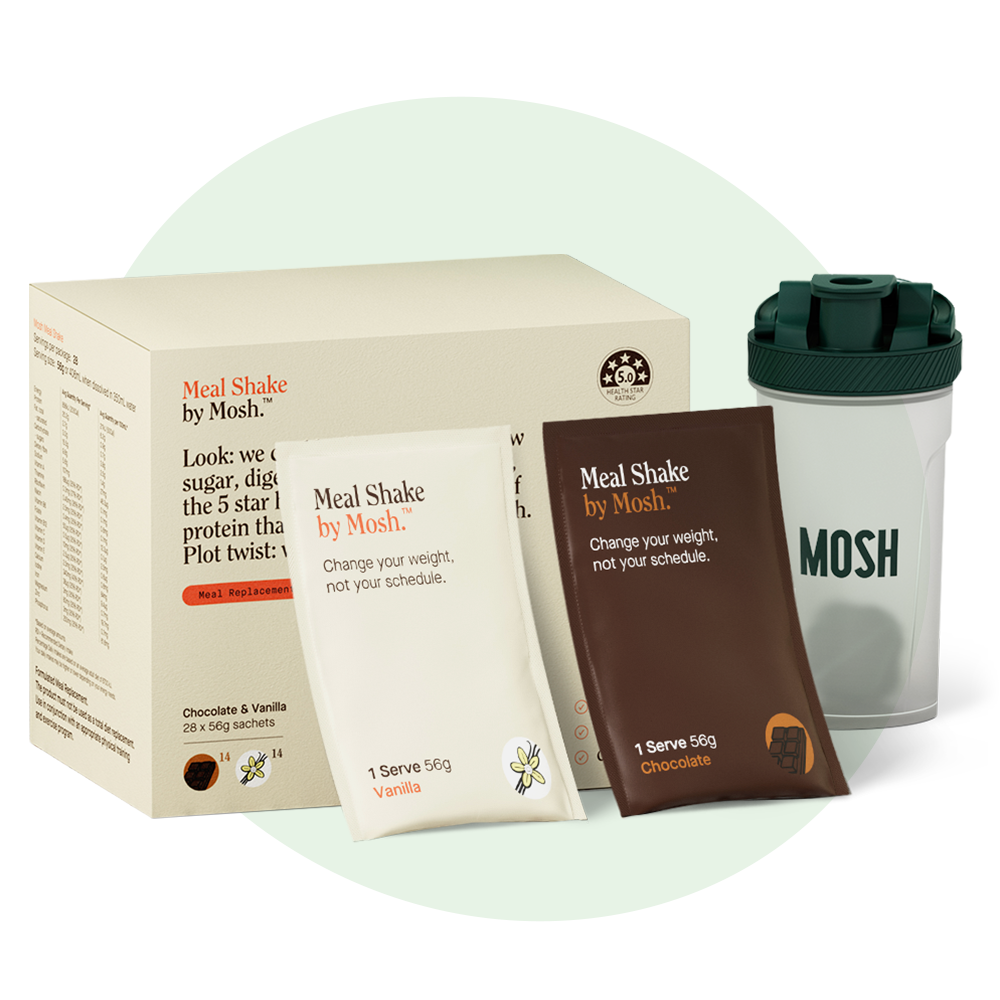
- Scientifically formulated Meal replacement shake designed especially for men
- High-quality whey protein, 22.4g per serve
- An essential blend of nutrients copper, selenium and a good source of zinc
- 24 vitamins and minerals and Protein and fibre to keep you fuller for longer
- Supports strength, vitality and energy
- Contributes to weight loss – banish the beer gut!
- Probiotics to support gut health
- Tomato (Lycopene) for heart and prostate health
- Contains a specialised blend for men; Green tea extract, Maca root powder, MCT, to kick start your day and workout properly
- No artificial colours, flavours or preservatives
- Quick and easy to make for on-the-go consumption
- No added sugar – sweetened naturally, no sucralose





